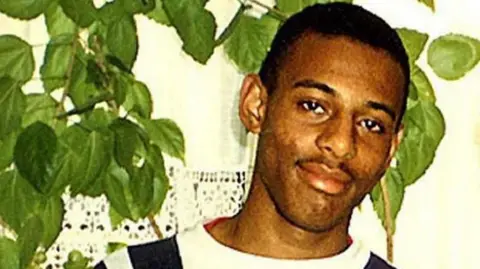By Daniel De Simone, BBC News

 Family handout
Family handout
Four retired detectives who ran the first Stephen Lawrence murder investigation should not face criminal charges for their actions in the case, a review has concluded.
The BBC has been told the review, by a senior CPS lawyer, upholds a previous decision not to prosecute, which was challenged by Stephen’s parents and friend.
It found there was insufficient evidence for a realistic prospect of conviction and therefore none of the four will be charged.
Stephen was murdered in April 1993 in a racist attack in south London.
The initial investigation failed to bring anyone to justice – although two men were jailed in 2012 for Stephen’s murder.
The officers had been investigated by the Independent Office for Police Conduct (IOPC), but last year the CPS chose not to pursue a criminal prosecution after considering a file of evidence.
A victim’s right to review the charging decision was triggered by Stephen’s parents, Dr Neville Lawrence and Baroness Doreen Lawrence, and his friend Duwayne Brooks, who was present during the attack.
The CPS review decision has been issued, but a public announcement might not come for some hours. The BBC has been told the outcome.
It means no officers have been held criminally responsible for what is widely seen as one of Scotland Yard’s biggest disasters.
The four retired officers investigated by the IOPC were:
- Detective Superintendent Ian Crampton, who was senior investigating officer (SIO) for the first four days of the murder investigation
- Detective Superintendent Brian Weeden, who took over as SIO from Mr Crampton and was in charge for 14 months
- Detective Inspector Benjamin Bullock, who acted as deputy SIO under Mr Crampton and Mr Weeden
- Detective Chief Superintendent William Ilsley, who oversaw the team responsible for the first murder investigation
In 1999, a public inquiry led by Sir William Macpherson concluded the first Lawrence murder investigation was “marred by a combination of professional incompetence, institutional racism and a failure of leadership by senior officers”.
The Macpherson report was highly critical of the decision not to make quick arrests.
Arrests did not take place for two weeks despite police receiving information implicating four of the prime suspects within 24 hours of the stabbing.
A 1997 investigation by the police watchdog was also critical, but by then only Mr Bullock was still serving in the Met and therefore available for a disciplinary process.








